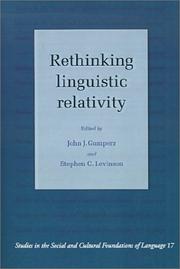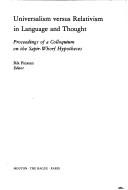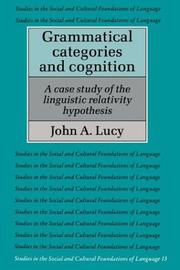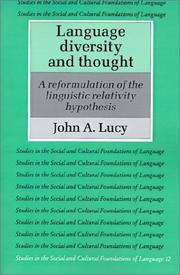| Listing 1 - 6 of 6 |
Sort by
|
Book
ISBN: 9780199361588 0199361584 0190468890 0199361606 0199361592 9780199361595 Year: 2014 Publisher: Oxford Oxford University Press
Abstract | Keywords | Export | Availability | Bookmark
 Loading...
Loading...Choose an application
- Reference Manager
- EndNote
- RefWorks (Direct export to RefWorks)
Japanese has a term that covers both green and blue. Russian has separate terms for dark and light blue. Does this mean that Russians perceive these colors differently from Japanese people? Does language control and limit the way we think?This short, opinionated book addresses the Sapir-Whorf hypothesis, which argues that the language we speak shapes the way we perceive the world. Linguist John McWhorter argues that while this idea is mesmerizing, it is plainly wrong. It is language that reflects culture and worldview, not the other way around. The fact that a language has only one word for eat, drink, and smoke doesn't mean its speakers don't process the difference between food and beverage, and those who use the same word for blue and green perceive those two colors just as vividly as others do.McWhorter shows not only how the idea of language as a lens fails but also why we want so badly to believe it: we're eager to celebrate diversity by acknowledging the intelligence of peoples who may not think like we do. Though well-intentioned, our belief in this idea poses an obstacle to a better understanding of human nature and even trivializes the people we seek to celebrate. The reality -- that all humans think alike -- provides another, better way for us to acknowledge the intelligence of all peoples.
Psycholinguistics --- Sociolinguistics --- Language and culture. --- Sapir-Whorf hypothesis. --- Relativity (Linguistics) --- Whorf-Sapir hypothesis --- Anthropological linguistics --- Culture and language --- Culture --- Language and culture --- Sapir-Whorf hypothesis --- Langage et culture. --- Hypothèse de Sapir-Whorf.

ISBN: 0820433438 Year: 1998 Publisher: Frankfurt am Main Lang
Abstract | Keywords | Export | Availability | Bookmark
 Loading...
Loading...Choose an application
- Reference Manager
- EndNote
- RefWorks (Direct export to RefWorks)
Chinois (langue) --- Taïwanais (langue) --- Interlangue (enseignement des langues) --- Linguistique --- Contrastive linguistics --- English language --- Interlanguage (Language learning) --- Rhetoric --- Sapir-Whorf hypothesis --- Relativity (Linguistics) --- Whorf-Sapir hypothesis --- Anthropological linguistics --- Psycholinguistics --- Sociolinguistics --- Language and languages --- Speaking --- Authorship --- Expression --- Literary style --- Language acquisition --- Languages, Mixed --- Germanic languages --- Linguistics --- Study and teaching&delete& --- Chinese speakers --- Study and teaching --- Linguistique.

ISBN: 0521448905 9780521448901 Year: 1997 Volume: 17 Publisher: Cambridge : Cambridge university press,
Abstract | Keywords | Export | Availability | Bookmark
 Loading...
Loading...Choose an application
- Reference Manager
- EndNote
- RefWorks (Direct export to RefWorks)
Sapir-Whorf hypothesis. --- Thought and thinking. --- Language and culture --- Sapir-Whorf hypothesis --- Thought and thinking --- Mind --- Thinking --- Thoughts --- Educational psychology --- Philosophy --- Psychology --- Intellect --- Logic --- Perception --- Psycholinguistics --- Self --- Relativity (Linguistics) --- Whorf-Sapir hypothesis --- Anthropological linguistics --- Sociolinguistics --- Culture and language --- Culture --- Semiotic models --- Culture - Semiotic models

ISBN: 9027977917 3110805820 Year: 1976 Volume: 11. Publisher: The Hague : Mouton,
Abstract | Keywords | Export | Availability | Bookmark
 Loading...
Loading...Choose an application
- Reference Manager
- EndNote
- RefWorks (Direct export to RefWorks)
No detailed description available for "Universalism versus Relativism in Language and Thought".
Sapir-Whorf hypothesis --- Grammar, Comparative and general --- Psycholinguistics --- Congresses --- Congresses. --- Hypothèse de Sapir-Whorf --- Grammaire --- Psycholinguistique --- Sapir-Whorf, Hypothèse de --- Grammaire comparée et générale --- Congrès --- #PBIB:2003.3 --- #PBIB:gift 2003 --- Relativity (Linguistics) --- Whorf-Sapir hypothesis --- Anthropological linguistics --- Sociolinguistics --- Hypothèse de Sapir-Whorf. --- Linguistics --- Philology

ISBN: 0521384192 0521566207 0511620713 Year: 1992 Publisher: Cambridge : Cambridge University Press,
Abstract | Keywords | Export | Availability | Bookmark
 Loading...
Loading...Choose an application
- Reference Manager
- EndNote
- RefWorks (Direct export to RefWorks)
Grammatical Categories and Cognition uses original, empirical data to examine the Sapir-Whorf linguistic relativity hypothesis: the proposal that the grammar of the particular language we speak affects the way we think about reality. The author compares the grammar of American English with that of Yucatec Maya, an indigenous language spoken in south-eastern Mexico, focusing on differences in the number marking patterns of the two languages. He then identifies distinctive patterns of thought relating to these differences by means of a systematic assessment of memory and classification preferences among speakers of both languages. The study illustrates the distinct approach to empirical research on the linguistic relativity hypothesis which Lucy develops in a companion volume Language Diversity and Thought.
Amerindian languages --- English language --- Comparative linguistics --- Grammar --- Sociolinguistics --- Cognition --- Grammar, Comparative and general --- -Sapir-Whorf hypothesis --- Relativity (Linguistics) --- Whorf-Sapir hypothesis --- Anthropological linguistics --- Psycholinguistics --- Psychology --- Comparative grammar --- Grammar, Philosophical --- Grammar, Universal --- Language and languages --- Philosophical grammar --- Linguistics --- Philology --- Grammatical categories --- Grammar, Comparative --- Sapir-Whorf hypothesis. --- Grammatical categories. --- Sapir-Whorf hypothesis --- Categories, Grammatical --- Categorization (Linguistics) --- Componential analysis (Linguistics) --- Major form classes --- Cognition. --- Arts and Humanities --- Language & Linguistics

ISBN: 0521387973 0521384184 9780521387972 9780511620843 9780521384186 0511620845 Year: 1992 Volume: 12 Publisher: Cambridge : Cambridge University Press,
Abstract | Keywords | Export | Availability | Bookmark
 Loading...
Loading...Choose an application
- Reference Manager
- EndNote
- RefWorks (Direct export to RefWorks)
Language Diversity and Thought examines the Sapir-Whorf linguistic relativity hypothesis: the proposal that the grammar of the particular language we speak affects the way we think about reality. Adopting an historical approach, the book reviews the various lines of empirical inquiry which arose in America in response to the ideas of anthropologists Edward Sapir and Benjamin L. Whorf. John Lucy asks why there has been so little fruitful empirical research on this problem and what lessons can be learned from past work. He then proposes a new, more adequate approach to future empirical research. A companion volume, Grammatical Categories and Cognition, illustrates the proposed approach with an original case study. The study compares the grammar of American English with that of Yucatec Maya, an indigenous language spoken in southeastern Mexico, and then identifies distinctive patterns of thinking related to the differences between the two languages.
800:159 --- #SBIB:309H518 --- 800:159 Psycholinguistiek. Neurolinguistiek --- Psycholinguistiek. Neurolinguistiek --- Verbale communicatie: sociologie, antropologie, sociolinguistiek --- Language and languages --- Sapir-Whorf hypothesis --- Thought and thinking --- Mind --- Thinking --- Thoughts --- Educational psychology --- Philosophy --- Psychology --- Intellect --- Logic --- Perception --- Psycholinguistics --- Self --- Relativity (Linguistics) --- Whorf-Sapir hypothesis --- Anthropological linguistics --- Sociolinguistics --- Characterology of speech --- Language diversity --- Language subsystems --- Language variation --- Linguistic diversity --- Variation in language --- Variation --- Sapir-Whorf hypothesis. --- Thought and thinking. --- Arts and Humanities --- Language & Linguistics --- Hipòtesi de Sapir-Whorf --- Llenguatge i llengües --- Pensament --- Psicologia pedagògica --- Associació d'idees --- Atenció --- Criteri --- Definició (Lògica) --- Dogmatisme --- Ideologia --- Pensament crític --- Raonament (Psicologia) --- Treball intel·lectual --- Cognició --- Lògica --- Representació (Filosofia) --- Llengües --- Llengües i llenguatge --- Antropologia --- Filologia --- Comunicació escrita --- Conversa --- Elocució --- Escriptura --- Espai i temps en el llenguatge --- Lingüística --- Llengua d'ensenyament --- Llengua materna --- Llenguatge de les flors --- Llenguatge de signes --- Llenguatge infantil --- Llengües indígenes d'Amèrica --- Llengües modernes --- Multilingüisme --- Oratòria --- Sociolingüística --- Traducció --- Veu --- Comunicació --- Didàctica de la llengua --- Gramàtica --- Llenguatge a Internet --- Origen del llenguatge --- Relativitat (Lingüística) --- Etnolingüística --- Psicolingüística --- Variation. --- Language and languages - Variation --- Pensament màgic
| Listing 1 - 6 of 6 |
Sort by
|

 Search
Search Feedback
Feedback About
About Help
Help News
News